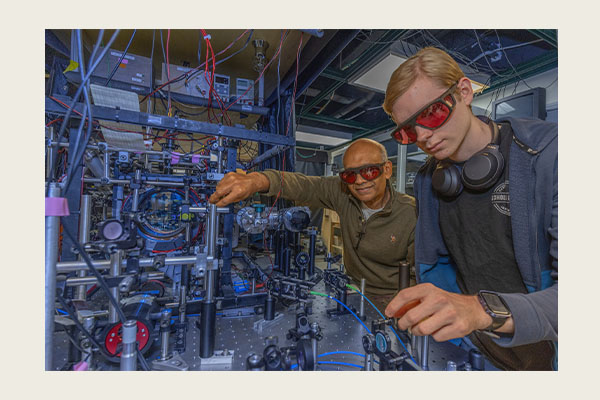Quantum leap
Miami student taking quantum computing by storm, helping university to lead in cutting-edge field
“This degree has been developed with great input from researchers from Cleveland Clinic and members of the industry, and we look forward to delivering an innovative and comprehensive curriculum,” Miami President Gregory Crawford said. “Our new Bachelor of Science in Quantum Computing will establish a pipeline to help attract, retain, and anchor talented individuals in Ohio.”
A prime example is Glenn Ochsner, a Class of 2026 student majoring in Physics and Mathematics, with a minor in electrical engineering, who conducts research with faculty mentor Imran Mirza, assistant professor of Physics, in his Theoretical Quantum Information Lab in the Department of Physics. She is collaborating to develop optical ring resonators, aiming to push the boundaries of quantum computing and advance the field of quantum information technology.
“Miami has done a great job of introducing me to fundamental concepts in the field, because even the introductory concepts still mean pretty difficult physics courses,” Ochsner said. “They've challenged me and taught me how to be good at working through problems, so I can derive meaningful results.”
Though still in its early stages of development, the purpose of quantum computing is to tackle intricate problems that confound even the most powerful supercomputers, whether due to computational feasibility or speed limitations. Once fully realized, these devices will perform intricate calculations at lightning speeds that transcend our current capabilities, transforming problems that would take classical computers thousands of years to solve into mere moments of processing.
“Quantum technologies are a very hot topic of research,” Mirza explained. “With the U.S. government launching a national quantum initiative, there’s an urgent need for workforce development. Any student engaging with this research will be at the forefront of the technological revolutions promised.”
In a bold move to lead the charge in this area, Miami has forged a partnership with Cleveland Clinic, which hosts the IBM Quantum System One — a quantum computer designed to redefine the frontiers of healthcare research. To amplify their united mission, Miami will also launch a state-of-the-art facility in the Cleveland Innovation District that offers students like Ochsner invaluable internship opportunities, allowing them to sharpen their skills in computing, biomedical engineering, biochemistry, and premedical studies.
“I think Miami is an excellent institution in the sense that, not only does it provide top-notch teaching to undergraduate students, but it also allows these students to get involved in the forefront of research areas, and along the way, they get all the skills that are needed for them to become successful in their future careers,” Mirza said. “For example, what Glenn is working on is going to make quantum computing devices scalable while fighting against all the noise and environmental effects that disturb their special functionalities. So, our work is going to play a crucial role in the future commercialization of those devices.”
As highlighted by President Crawford, Miami's new program was created to address Ohio's workforce needs while bolstering economic resilience through advancements in quantum technology, underscored by the research conducted by Mirza and Ochsner. This innovation positions Ohio to lead the quantum computing industry, creating a powerful pipeline for talent and innovation within the state.
Yet, its significance extends far beyond the technical realm: it exemplifies the vital role of guided mentorship. The partnership between Mirza and Ochsner has not only propelled the field forward but has also empowered Ochsner with the expertise and insights necessary to become a future leader in science and technology.
“It's really cool getting to see the work that I’ve put into both my academics and my research with Dr. Mirza recognized by the department,” she said. “He does everything he can to support me, to prepare me to go to graduate school and to get me into all these cool programs. Because of his support, I'm going to finish my undergraduate here at Miami, and then jump straight to a Ph.D. program.”

Mirza and Samir Bali, professor of Physics, recently received a $796,516 grant from the National Science Foundation's Expanding Capacity in Quantum Information Science and Engineering (ExpandQISE) program for the project "ExpandQISE: Track 1: Bright Highly Polarization-Squeezed Light Beam for Quantum Metrology."
Their research exploits "the physics of quantum entanglement to engineer a 'super perfect' beam of light that has significantly less fluctuations than the most stable laser beam one could ever hope to achieve," according to Bali.
The grant will also help the researchers expand Quantum Information Science and Engineering (QISE) at Miami by developing new QISE-centered physics courses.
"Our project provides intensive one-on-one mentoring to Miami STEM students at all levels, a critical step towards building the quantum workforce needed in industry and academia," Bali explained.